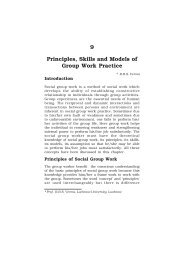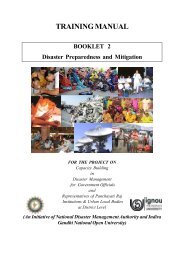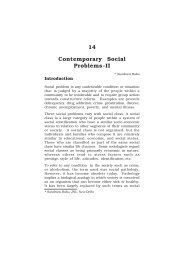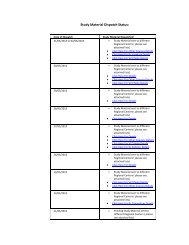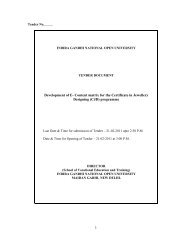Disaster Recovery and the Road Ahead - IGNOU
Disaster Recovery and the Road Ahead - IGNOU
Disaster Recovery and the Road Ahead - IGNOU
Create successful ePaper yourself
Turn your PDF publications into a flip-book with our unique Google optimized e-Paper software.
iii)<br />
iv)<br />
In <strong>the</strong> rescue phase, emergency services personnel are involved in responding to <strong>the</strong> victims<br />
<strong>and</strong> <strong>the</strong> survivors or victims are busy taking direction from <strong>the</strong>se groups without protest. They,<br />
more or less, trust <strong>the</strong> rescuers <strong>and</strong> feel that <strong>the</strong>y will address <strong>the</strong>ir needs, <strong>and</strong> that <strong>the</strong>y can<br />
<strong>the</strong>n put <strong>the</strong>ir lives back toge<strong>the</strong>r quickly<br />
In <strong>the</strong> recovery phase, survivors may believe that rescue efforts are not proceeding quickly<br />
enough. That feeling, combined with o<strong>the</strong>r emotional stressors (e.g., dealing with insurance<br />
agent <strong>and</strong> living in temporary accommodations) may cause survivors to turn against those who<br />
are trying to help <strong>the</strong>m. Always remember that this is <strong>the</strong> most crucial stage for you, as it is<br />
here that you need to put toge<strong>the</strong>r strategies to deal with such issues.<br />
Though, <strong>the</strong> first three phases are a part of disaster response phase, it is better to underst<strong>and</strong> all<br />
<strong>the</strong> four phases holistically to grapple with victims’ psychological health in <strong>the</strong> recovery phase.<br />
<strong>Disaster</strong> recovery planning is not merely a scientific technique. Even if <strong>the</strong> disaster recovery plan<br />
is foolproof <strong>and</strong> takes care of each <strong>and</strong> every nitty gritty of providing relief <strong>and</strong> comfort, <strong>the</strong>re are<br />
certain factors, which need to be kept in view in order to humanize <strong>the</strong> recovery efforts. The<br />
recovery team must be clear about all post-disaster symptoms, as depicted below:<br />
Post-disaster Psychological <strong>and</strong> Physiological Symptoms:<br />
PSYCHOLOGICAL SYMPTOMS<br />
PHYSIOLOGICAL SYMPTOMS<br />
Irritability or anger Loss of appetite<br />
Self-blame, blaming o<strong>the</strong>rs Headaches<br />
Isolation, withdrawal Chest pain<br />
Fear of recurrence Diarrhoea, stomach pain<br />
<br />
Feeling stunned, numb or<br />
overwhelmed<br />
Nausea<br />
Feeling helpless Nightmares<br />
<br />
Concentration <strong>and</strong> memory<br />
problems<br />
Inability to sleep<br />
Sadness, depression, grief Fatigue, low energy<br />
Denial Hyperactivity<br />
Mood swings Increase in alcohol or drug consumption<br />
The intensity, timing <strong>and</strong> duration of <strong>the</strong>se responses will vary from person to person. They may be:<br />
<br />
<br />
<br />
Acute or mild<br />
Immediate <strong>and</strong>/or delayed<br />
Cumulative in intensity<br />
42





